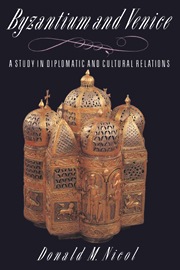Book contents
- Frontmatter
- Contents
- Dedication
- Preface
- List of abbreviations
- Maps of the Byzantine and Venetian worlds
- 1 Venice: the Byzantine province
- 2 Venice: the Byzantine protectorate
- 3 Venice: the ally of Byzantium
- 4 Venice: the partner of Byzantium
- 5 Byzantium, Venice and the First Crusade
- 6 The parting of the ways
- 7 The calm before the storm
- 8 The Fourth Crusade
- 9 Venice in Byzantium: the Empire of Romania
- 10 Venice: champion of a lost cause
- 11 Byzantium, Venice and the Angevin threat
- 12 Byzantium, Venice and Genoa
- 13 Conflicting interests and competing claims
- 14 Byzantium, Venice and the Turks
- 15 Byzantium: the victim of commercial rivalry
- 16 The profit and honour of Venice
- 17 Jewels for an island
- 18 Byzantium in thrall to the Turks and in debt to Venice
- 19 Byzantine optimism and Venetian vacillation
- 20 Byzantium the suppliant of Venice
- 21 The worst news for all of Christendom: Venice and the fall of Constantinople
- 22 Legacies and debts
- Byzantine Emperors
- Doges of Venice
- Bibliography
- Index
13 - Conflicting interests and competing claims
Published online by Cambridge University Press: 01 April 2010
- Frontmatter
- Contents
- Dedication
- Preface
- List of abbreviations
- Maps of the Byzantine and Venetian worlds
- 1 Venice: the Byzantine province
- 2 Venice: the Byzantine protectorate
- 3 Venice: the ally of Byzantium
- 4 Venice: the partner of Byzantium
- 5 Byzantium, Venice and the First Crusade
- 6 The parting of the ways
- 7 The calm before the storm
- 8 The Fourth Crusade
- 9 Venice in Byzantium: the Empire of Romania
- 10 Venice: champion of a lost cause
- 11 Byzantium, Venice and the Angevin threat
- 12 Byzantium, Venice and Genoa
- 13 Conflicting interests and competing claims
- 14 Byzantium, Venice and the Turks
- 15 Byzantium: the victim of commercial rivalry
- 16 The profit and honour of Venice
- 17 Jewels for an island
- 18 Byzantium in thrall to the Turks and in debt to Venice
- 19 Byzantine optimism and Venetian vacillation
- 20 Byzantium the suppliant of Venice
- 21 The worst news for all of Christendom: Venice and the fall of Constantinople
- 22 Legacies and debts
- Byzantine Emperors
- Doges of Venice
- Bibliography
- Index
Summary
In the decade before the signing of their new treaty in 1310 both Constantinople and Venice had suffered harrowing experiences. The Emperor Andronikos had been unnerved by the depredations of the Catalans in Thrace. He seemed to have no plan for the rescue of Asia Minor from the Turks. Constantinople was packed with thousands of refugees. They were homeless and they were hungry. There had once been a central system of control over the wholesale and retail trade in food in the city. It had long since broken down. The emperor had not the time or the talent to revive it. He was too feeble and confused to overrule his civil servants or to punish them for their dishonesty and inefficiency. The people starved while the rich businessmen in Constantinople, not all of them Italians, piled their granaries with grain to sell at high prices when the market was low. Byzantine writers of the time condemned the bribery and corruption of imperial officials and the anti-social greed of wealthy entrepreneurs. What the emperor seemed powerless to remedy, the patriarch roundly and loudly denounced.
The Patriarch Athanasios (1289–93; 1303–09) was moved by a social conscience rare even among Byzantine monks. He was a hermit by inclination and his standards of mortification and puritanism were higher than many of his clergy could tolerate. He was forced to resign in 1293. Ten years later he was recalled in a wave of popular frenzy, for the poor and the hungry of Constantinople looked on him as a man of God who put God's precepts into practice by caring for them.
- Type
- Chapter
- Information
- Byzantium and VeniceA Study in Diplomatic and Cultural Relations, pp. 228 - 245Publisher: Cambridge University PressPrint publication year: 1989



